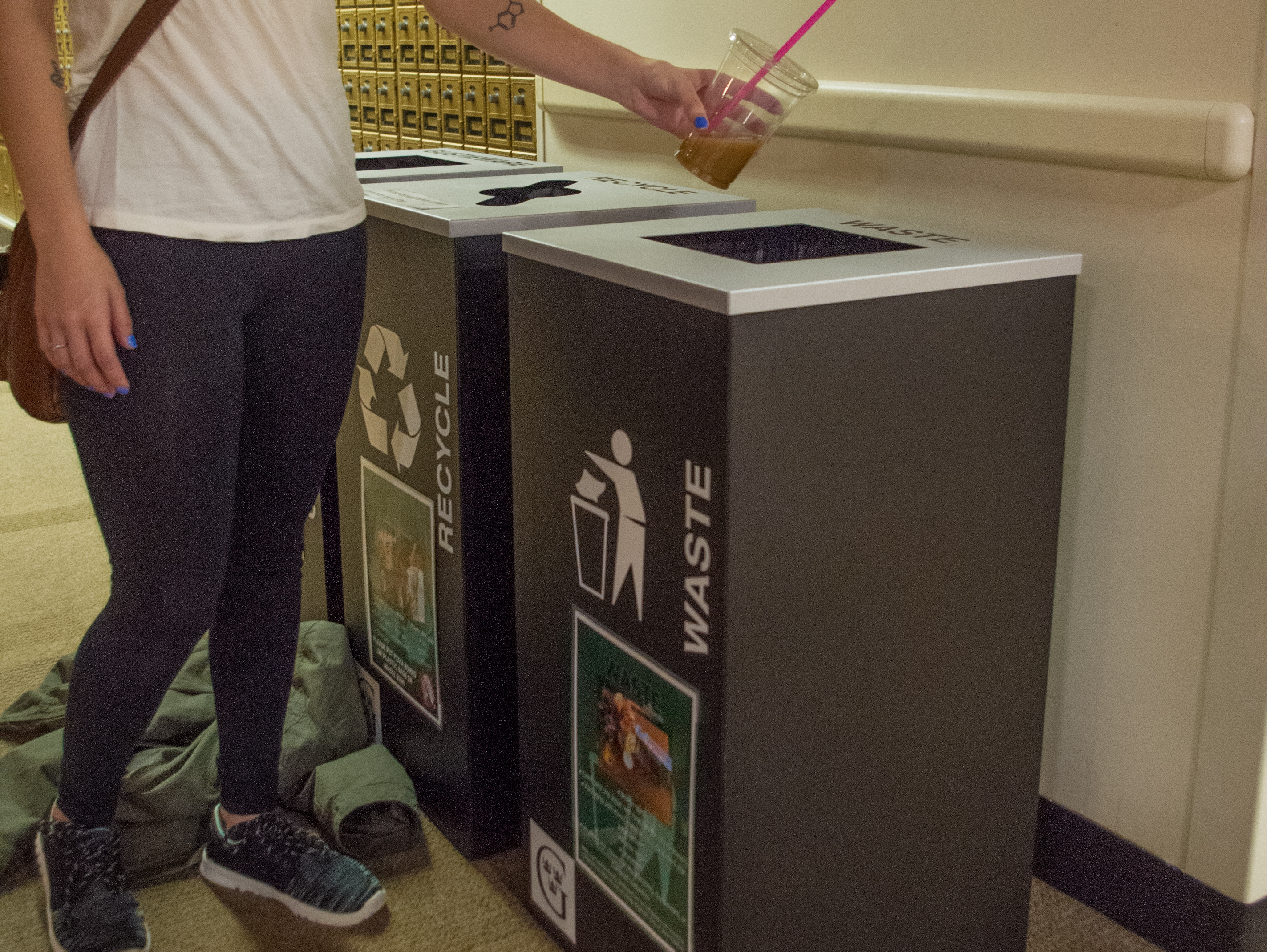Fall is a season of transitions.
As the leaves start to turn and classes begin, stress levels rise to levels that were, at one point, not thought possible.
Between academic, social, and extracurricular responsibilities, students are juggling a lot.
The last thing they want to deal with is figuring out which recyclable goes in which bin.
It is this exact problem that Gustavus is working to address.
As of this semester, the school has adopted a new single stream recycling system, with one bin for all recyclable materials.
This is contrast to the previous dual stream system in which recyclables had to be sorted into separate labeled bins.
The change was initiated by the Kitchen Cabinet, an advisory board created to help the dining services achieve a more sustainable model.
With the generous award of an anonymous grant, the organization decided to not only establish new recycling and compost bins, but also took the overhaul as an opportunity to change the recycling model the school had in place.
“The thought was that it would be easier for college students coming from cities that do single-sort systems, so they were hoping that it would decrease the amount of trash and other junk that ends up in the recycling,” Gustavus Greens co-president Gwen Saliares, who is also a member of the Kitchen Cabinet said.
According to Saliares, when trash is mixed in with recyclable products, the custodial staff is, for health and safety reasons, not permitted to sift through and pick it out.
Instead, they must dispose of the trash—along with the contaminated recyclables.
“It’d be really nice to reduce the amount of waste we have and increase the amount of stuff we can actually recycle,” Saliares said.
The hope is that, by establishing a single sort recycling system, the amount of trash that is needlessly created—from contaminated recyclables as well as discarded plastics and papers—can be taken away from the incinerator and brought instead to the processing plant.
All of the old bins labeled for different recyclables have been repurposed as co-mingling bins.
In addition, brand new bins complete with options for compost, waste, recycle, and GustieWare have been placed in the Campus Center as well as the three freshmen dorms: Norelius, Pittman, and Sohre.
With the success of this project, it is hoped that more of the new recycling units can be purchased and distributed across campus so that recycling becomes as easy as throwing away trash.
As of right now, four of the six recycling stations have compost available. Dining Service’s Steve Kjellgren went on to say that “In the stations where there is a green bin, where there’s compost, [the staff] finds a nice clean stream. Folks actually bring compost from home. In the two other stations where there isn’t a compost, interestingly the compost goes in the… GustieWare [bin] because it will go into the dishroom and get sorted before going into the compost stream. That gives us hope that Gustavus students want to do the right thing.”
The goal of this large-scale effort is ultimately to instill an environmental doctrine in the backs of students’ minds.
With such a large emphasis on the recycling presence here at school, this campaign aims to increase students’ environmental consciousness and make sustainability a normal practice. Already we see this mentality in many of the students.
When asked for her take on the new system, Karen Kepka, the campus’s custodial coordinator, had this to say: “So far all of the systems are going well. The only complaints I’ve gotten is we need more containers.”
The system is so far having a great turnout with student participation, and as the network grows and we get more bins in more buildings, we hope to see a continued utilization of this new resource.
“You kind of want it to be habitual in the sense that they don’t have to think about it, that it’s so common and such a habit that they just do it all the time instead of having to remind themselves, ‘Oh, I have to be sustainable today,’” Saliares said. “It’d be great if they also did that. But to make it an everyday act so that they always know just to recycle—that’d be the goal.”
The people of this world must take some initiative before our resources are in a comfortable position of sustainability, and it is with incremental steps such as the ones Gustavus leadership is taking that will pull us toward that future.
Systemic changes such as this help to a point, but there comes a time when personal accountability must be emphasized.
Saliares said that she encourages students to be mindful and pay attention when recycling, and to use this as a “jumping-off-point” to think about other ways that they can continue Gustavus’s efforts toward a more sustainable practice.
